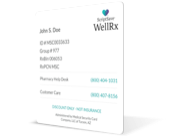Copyright 2025
Medical Security Card Company, LLC
All Rights Reserved
We take the privacy of your personal information seriously. By signing up I agree to WellRx's terms of use and privacy policy.
by Randall Flores, PharmD Candidate 2019
University of Arizona
December 04, 2018
Bleeding can manifest itself in a variety of different ways which, at times, may not be easy to recognize. Some bleeds are also more serious than others and may require emergency medical attention. Bleeding frequency may also vary depending on a variety of factors such as underlying bleeding disorders or the use of certain medications.5
| Gastrointestinal Bleeds5 | |
|
|
| Urinary Tract Bleeds5 | |
|
|
| Nosebleeds5 | |
|
|
| Throat Bleeds5 | |
|
|
| Eye Bleeds5 | |
|
|
Anticoagulation therapy is vital to the prevention and treatment of thromboembolic diseases; however, close monitoring is very important to treat and prevent harmful adverse effects. Lab monitoring is an important part of anticoagulation therapy to determine if it is necessary to counterbalance the anticoagulant effect of the drug4. Each drug has its own recommendations on lab monitoring depending on how it works in the body and possible adverse effects.
Coumadin (warfarin) remains the most prescribed oral anticoagulant medication worldwide despite the higher risk for bleeding compared to alternative anticoagulants1. The use of warfarin entails frequent blood tests and patient education about food and drug interactions4. The laboratory test that are most frequently monitored are prothrombin time (PT) and international normalized ratio (INR). PT is a test used to measure the number of seconds it takes for a clot to form3. INR on the other hand, is a more standardized PT measure so that it may serve as a reference value on how to adjust the dose depending on the result3. Higher INRs represent thinner blood, while lower INRs represent thicker blood. [ Read more on our blog post, Losing the War With Warfarin? ]
New oral anticoagulants (NOACs) now formally known as direct oral anticoagulants (DOACs) have a few advantages over the use of warfarin. DOACs include dabigatran (Pradaxa), rivaroxaban (Xarelto), and apixaban (Eliquis). One of the biggest advantages over warfarin is that DOACs typically do not require dose adjustments and routine monitoring4. There are however some recommendations of monitoring certain parameters in patients with specific circumstances and comorbidities. Kidney function is an important parameter to monitor because all DOACs are eliminated by the kidney and impairment is a risk factor for bleeding1.
There are several reversal agent options for warfarin, despite its challenging management. The reversal agents used for warfarin include phytonadione (vitamin K), fresh frozen plasma (FFP), and prothrombin complex concentrate (PCC)2. The availability of these agents makes warfarin a viable option for patients who are at increased risk of bleeding and enables it to still be recommended by guidelines2.
DOACs are becoming more popular due to safety and efficacy over other anticoagulants, however only one of these agents has an FDA-approved reversal agent. Praxbind (idarucizumab) received accelerated FDA approval due to its promising results in clinical trials as a reversal agent to dabigatran (Pradaxa)2.
Currently, there is one agent called andexanet alfa that in phase III clinical trials as a reversal agent to the remaining DOAC agents2. As the use of DOAC agents become more popular, the need for effective antidotes is demanded.
Whether a someone is on anticoagulant therapy or not, it is important for people to have a general understanding about bleeding risks and how to identify different types of bleeds. Patients on anticoagulant therapy should also have a general idea about the monitoring that their therapy entails, potential risks, and management of those risks. The more patients know, the lower their chance of hospitalization from bleeding.
References:
1 Conway, S. E., Hwang, A. Y., Ponte, C. D., & Gums, J. G. (2016). Laboratory and Clinical Monitoring of Direct Acting Oral Anticoagulants: What Clinicians Need to Know. Pharmacotherapy, 37(2), 236-248. doi:https://doi.org/10.1002/phar.1884
2 Griffiths, C., Vestal, M., Livengood, S. and Hicks, S. (2017). Reversal agents for oral anticoagulants. [online] The Nurse Practitioner. Available at: https://journals.lww.com/tnpj/fulltext/2017/11000/Reversal_agents_for_oral_anticoagulants.2.aspx [Accessed 21 Sep. 2018].
3 Hull , R., Garcia, D., Vazquez, S. (2018). Warfarin (Coumadin) Beyond the Basics. UpToDate. Retrieved from https://www.uptodate.com/contents/warfarin-coumadin-beyond-the-basics
4 Ramos-Esquivel, A. (2015). Monitoring anticoagulant therapy with new oral agents. World Journal of Methodology, 5(4), 212–215. http://doi.org/10.5662/wjm.v5.i4.212
5 The Basics of Bleeding Disorders. (2018). National Hemophilia Foundation. Retrieved September 19, 2018, from https://stepsforliving.hemophilia.org/basics-of-bleeding-disorders/identifying-types-of-bleeds

For your convenience, use the ScriptSave® WellRx mobile app. Now savings are well in hand, right at the pharmacy counter. Save on your family's prescription medicines.
Learn More
Your choice. Get a ScriptSave WellRx Savings Card. Or Download the free mobile app from the App Store or Google Play Store
Get A Card
ScriptSave WellRx Grocery Guidance leverages leading-edge nutritional data science to help you know which food products on your grocery store shelf are truly good for YOU.
Healthy Foods For YouTags:

July 30, 2025

July 23, 2025

July 16, 2025
You need to log into the site to use this feature
This feature requires registration. Sign up or log in to your free WellRx account to gain access to this and other tools to help make managing your medications and wellness easier.
Benefits Include:
 Store & manage your medication list
Store & manage your medication list
 Medication pricing updates
Medication pricing updates
 Medication information
Medication information
 Pill & refill reminders
Pill & refill reminders
 Medication journal & mood log
Medication journal & mood log
This feature requires registration. Sign up or log in to your free WellRx account to gain access to this and other tools to help make managing your medications and wellness easier.
Benefits Include:
 Store & manage your medication list
Store & manage your medication list
 Medication pricing updates
Medication pricing updates
 Medication information
Medication information
 Pill & refill reminders
Pill & refill reminders
 Medication journal & mood log
Medication journal & mood log
You will be redirected to your program in 5 seconds.
Our Terms and Conditions and Privacy Policy have recently been updated.
By declining you will be logged out of your account